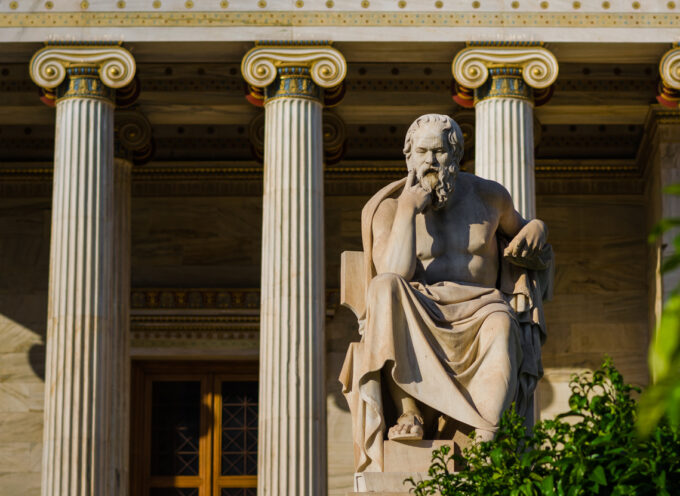[Note: This post provides a glimpse into the life of Southeastern Baptist Theological Seminary, where I serve as Provost and Professor of Theology & Culture. Written as the opening presentation of our 2013 Faculty Workshop, it gives voice to Southeastern’s aspiration to be a “Great Commission Seminary.” The first portion of the essay articulates 3 core convictions gleaned from Matthew’s version of the Great Commission. The second portion expands upon the 5 academic “core competencies” our faculty is determined to instill in our students. The third portion eludicates the 5 criteria we use to evaluate ourselves as faculty members. It concludes briefly with a reflection on the relationship between faithfulness and excellence.]
Introduction
Southeastern possesses a clear identity, confession, and mission. The seminary is an institution of higher learning and a Cooperative Program ministry of the Southern Baptist Convention. Its faculty members confess the Bible as the authoritative Word of God and covenant to teach in accordance with, and not contrary to, the Abstract of Principles and the Baptist Faith & Message. They further affirm the Chicago Statement on Biblical Inerrancy and the Danvers Statement on Biblical Manhood and Womanhood. Together with the Board of Trustees and the administration, faculty members share a mission in which “Southeastern Baptist Theological Seminary seeks to glorify the Lord Jesus Christ by equipping students to serve the church and fulfill the Great Commission (Mt 28:19–20).” In summary, Southeastern is a confessional seminary in the Southern Baptist stream of historic Christianity whose mission is to be a Great Commission seminary.
I. A Great Commission God
The seminary’s rationale for its mission is undergirded by theology. To speak about mission is to speak about the Triune God whose identity, character, and mission are depicted in Christian Scripture. This God created man and woman in his image, and entrusted them with the tasks of being fruitful and multiplying, tilling the soil, and being stewards of the created order (Gen 1:26–28; 2:15). They were to be vice-kings under God the King. At the time of creation, they lived in right relationship with God, with each other, and with the created order. This state of universal flourishing, order, and peace is encapsulated in the biblical concept of shalom.
As the biblical story continues, we learn that Adam and Eve sinned against God, unleashing consequences upon the created world that were deeper and more pervasive than we might typically imagine. Their social (be fruitful and multiply) and cultural (till the soil) lives were now distorted and misdirected by their sin. Their relationships with God, each other, and the created order were broken.
In response to their sin, God responded not only with a curse (Gen 3:14–19), but also a promise of life (Gen 3:15), in which the Seed of the woman would destroy the serpent, thereby eradicating sin and death, and restoring God’s intended shalom. This Seed was Christ Jesus, the Son of God. Through the Son’s life, ministry, miracles, death, and resurrection, he fulfilled his ministry as Savior of the world. By his stripes we are healed, and upon his shoulders the sin of the world was borne (Is 52:13–53:12).
God’s plans for redemption will culminate one day as believers from every tribe, tongue, people, and nation (Rev 5) worship the Lord Christ on in the restored and renewed creation—a new heaven and earth (Rev 21; 22). This new creation is one “in which righteousness dwells” (2 Pet 3:13) and in which “creation itself will be set free from its bondage to decay and obtain the freedom of the glory of the children of God” (Rom 8:21), thus fulfilling God’s good purposes for his world. The mission of God culminates in God the King’s dwelling with redeemed anthropos in a renewed cosmos.
II. A Great Commission Seminary
The mission of God is one in which he redeems his imagers and restores his good creation. However, we find ourselves living in an era between the first and second comings of our Lord, an era in which Christ’s reign has been initiated but not fully realized. In this time “between the times,” the Lord commissions us to be signs and instruments of his Kingdom, bringing the totality of our lives under submission to his Lordship, and making disciples of all the nations.
Matthew writes, “And Jesus came and spoke to them, saying, ‘All authority has been given to me in heaven and on earth. Go therefore and make disciples of all the nations, baptizing them in the name of the Father and of the Son and of the Holy Spirit, teaching them to observe all things that I have commanded you; and lo, I am with you always, even to the end of the age.’ Amen” (Mt 28:19–20). Matthew presupposes the mission of God and applies it to the mission of God’s people in a way that is uniquely helpful for understanding Southeastern’s ministries. Arising from the main points of this text are three imperative characteristics our seminary faculty:
1. At Southeastern, we will not take for granted the Lordship of Christ.
Our Lord begins this passage by declaring all authority had been given to him in heaven and on earth. This “heaven and earth” language points us back to Genesis 1, linking Christ the Redeemer with God the Creator. Jesus Christ, crucified and risen from the dead, is the one true and living God. This Jesus—Lord of creation and new creation—is the one who commands us and does so with universal authority. A healthy Great Commission seminary, therefore, will provide an environment in which students learn to bring all of life under submission to Christ’s Lordship.
2. At Southeastern, disciple-making is the focal point of our mission.
Just as the Father sent Jesus, so Jesus sent them to others. “As the Father has sent me, I am sending you” (Jn 20:21). His directive is missiological, extending beyond Jerusalem to the uttermost reaches of the earth—to all tribes, tongues, peoples, and nations. It is proclamatory and prophetic, in that believer’s baptism by immersion serves as a proclamation and a picture of the gospel, and a preview of the coming Kingdom, when Christ the King will resurrect not only his anthropos but also his cosmos. It is ecclesiological, as baptism precedes and leads to fellowship with a local church. It is personal and spiritual, as baptism signifies one’s personal profession of allegiance to the Triune God. Finally, it is deeply pedagogical and theological as it involves teaching everything that Christ commanded, a charge that ultimately involves us in teaching the entirety of the Christian Scripture, in whom Christ is the towering actor and of whom Christ is the ultimate author.
A Great Commission seminary, therefore, is one in which students learn to study and to teach the Scriptures in their entirety; one which encourages personal and spiritual renewal and corporate spiritual vitality; one which understands its mission as arising from the church and in turn serving the church; one which pulses with the heartbeat of world mission, recognizing that we live in a time—between the times—when God is searching for servants who will say “Here I am” in willingness to take the gospel to every tribe, tongue, people, and nation.
3. At Southeastern we will engender trust in Christ, who alone can empower our mission.
In our mission to make disciples, the Lord will always be with us. He undergirds the mission with his presence and power, and will do so until the end. Because of his resurrection, the world has a deeply joyful ending, one in which the Lord redeems for himself worshipers from among every tribe, tongue, people, and nation, and he dwells with them forever in a renewed heaven and earth.
A Great Commission seminary, therefore, is one which engenders confidence in God, the gospel, and our mission. The task is daunting, but the magnitude of our task is matched and exceeded by the magnitude of our biblical convictions: that God is a missionary God; that a central theme in the Scriptures is God’s desire to win the nations unto himself; that God will do so through the gospel of his incarnate, crucified, and resurrected Son; that the church’s task in each generation is to proclaim the gospel, make disciples of the nations, and bring God glory in every conceivable manner; and that God has promised and will secure the final triumph of his gospel, even to the ends of the earth.
III. A Great Commission Curriculum
In light of their desire to facilitate a learning environment consistent with the seminary’s Great Commission vision, the Southeastern faculty and administration have identified five core competencies which undergird its curricula: spiritual formation, biblical exposition, theological integration, ministry preparation, and critical thinking and communication.
1. Spiritual Formation
Students are provided with the knowledge and skills necessary to pursue an authentically Christian way of life, manifested by trust in God, obedience to Christ’s commands, and love of God and neighbor. An Old Testament course, for example, teaches syntax and exegesis not as an end in itself, but as a means of increasing one’s affection for God, one’s desire to worship and obey him, and one’s determination to share the gospel with one’s neighbor. The proper end of any seminary course is not merely oriented to conceptual knowledge, but especially oriented to wise living.
“Let every Student be plainly instructed, and earnestly pressed, to consider well [that] the maine end of his life and studies is to know God and Jesus Christ which is eternall life, Jn 17:3, and therefore to lay Christ in the bottome, as the only foundation of all sound knowledge and Learning.” –Founders of Harvard College (1643)
2. Biblical Exposition
Students are taught to properly and effectively interpret, apply, and communicate the Scriptures. Each of the courses in the seminary’s curriculum is shaped in some manner by Christian Scripture, and therefore each course is a rich environment for biblical reflection. An evangelism course, for example, equips students to rightly interpret the biblical teaching concerning the gospel so that they can communicate it in personal conversations or public speaking opportunities.
“But everyone, indeed, knows that at times they [the Fathers] have erred as men will; therefore, I am ready to trust them only when they prove their opinions from Scripture, which has never erred.” –Martin Luther
3. Theological Integration
Students learn to understand and apply the doctrines of Christianity to life and ministry. Southeastern is by design an integrative institution. The components of reality form a coherent whole, so each discipline is integrally related to all others. A course in church planting, for example, might draw upon an exegesis of the book of Acts, a systematic treatment of the doctrine of the church, a historical overview of church planting methods, and an anthropological assessment of challenges for cross-cultural communicators.
“Fields of study and areas of life that are frequently compartmentalized in people’s minds actually belong together, particularly in our use of the Bible. God created us to be whole people. We are meant to respond as whole people to the whole of God. Every aspect of our being—our minds, our emotions, our physical abilities, our digestion, our tears—has been created by God to play a role in our communion with him and our service to him. The Psalms are examples in words of what holistic response involves….Stretching our categories helps force us to think about integrating what we may have too neatly compartmentalized.” –Vern Poythress
4. Ministry Preparation
Students acquire knowledge, skills, and the disposition necessary for ministry and leadership in the church and world. Every course at the seminary—bar none—exists to prepare students to minister Christ’s gospel in this world. The seminary is not a research university or a think tank. It is a greenhouse for gospel ministers. A philosophy course, for example, introduces metaphysics or epistemology, but never as ends in themselves; it covers such topics in a manner such that they can be comprehended by the broad range of students at the seminary and can be utilized in Christian ministry.
“But you must continue in the things which you have learned and been assured of, knowing from whom you have learned them, and that from childhood you have known the Holy Scriptures, which are able to make you wise for salvation through faith which is in Christ Jesus. All Scripture is given by inspiration of God, and is profitable for doctrine, for reproof, for correction, for instruction in righteousness, that the man of God may be complete, thoroughly equipped for every good work.” –The Apostle Paul (2 Tim 3:14–17)
5. Critical Thinking and Communication
Students learn to think critically, argue persuasively, and communicate clearly. Every aspect of Christian life and ministry is the argument of a thesis: Jesus is Lord. Critical thinking and communication are vital to the life of the seminary. A New Testament course, for example, will necessarily recognize the centrality of logic to the entire endeavor of New Testament studies, as an interpreter must draw upon powers of valid induction and deduction moment-by-moment in order to exegete a biblical text.
“Everything that can be thought at all can be thought clearly. Everything that can be said can be said clearly.” –Ludwig Wittgenstein
The faculty of Southeastern fosters these competencies across the curriculum, instilling them while cultivating a delight in God, his word, and his church. Because Southeastern seeks to be truly a “Great Commission Seminary” and envisions every classroom a “Great Commission Classroom,” each member of the faculty is committed to carrying out this mission as a “Great Commission Professor.”
IV. A Great Commission Faculty
A Great Commission faculty member is one whose professorial vocation is shaped not only by his or her confessional commitments but also by professional standards in the field of higher education. These confessional commitments and professional standards are the criteria by which faculty members are appointed, elected, and promoted, but more importantly are the criteria by which they can measure growth in their divinely-given vocation. Five criteria are noteworthy: Christian character, classroom instruction, research and writing, church and community service, and institutional commitment.
1. Christian character
Professors display a Christian way of life. One way of encapsulating this way of life is to say that they are actively engaged in obeying the Great Commission. Another way is to view it through the lens of the Great Commandment, which instructs, “And you shall love the Lord your God with all your heart, with all your soul, with all your mind, and with all your strength. This is the first commandment. The second like it, is this: You shall love your neighbor as yourself. There is no other commandment greater than these” (Mk 12:30–31). Faculty members love and honor God publicly in front of their students. They love and honor their fellow faculty members, the seminary’s administration and staff, and the students who sit under their tutelage. Such love is at odds with cynicism, hyper-criticism, and other vices which sometimes poison academic communities.
“The study of religious truth ought to be undertaken and prosecuted from a sense of duty, and with a view to the improvement of the heart. When learned, it ought not to be laid on the shelf, as an object of speculation; but it should be deposited deep in the heart, where its sanctifying power ought to be felt.” –J. L. Dagg
2. Classroom instruction
Professors shape their courses and pedagogy consciously in light of the mission, and the core competencies which cause students to flourish. A professor’s course never stands in a one-to-one relationship with any single core competency. Indeed, even though a particular course will emphasize certain competencies over others, it will somehow be related to all of the competencies. A systematic theology course, for example, will conceptualize and articulate truth by reflecting upon biblical teaching (biblical exposition), conceptualizing and articulating it (critical thinking and communication), bringing it into conversation with what has been learned in other courses (theological integration), applying it to life and ministry (ministry preparation), and allowing it to drive us deeper into fellowship with God. However, Great Commission classroom instruction extends beyond course design into instructional method and style. Great Commission professors value each student under their charge, embracing the challenge to teach every student the churches send, whether that student is undergraduate, graduate, or post-graduate; whether that student is residential or online; whether that student is learned or unlearned; whether that student is male or female; whether that student is a member of our ethnic and cultural heritage or not.
“To teach seriously is to lay hands on what is most vital in a human being. . . . Poor teaching, pedagogic routine, a style of instruction which is, unconsciously or not, cynical in its mere utilitarian aims, are ruinous. They tear up hope by its roots. Bad teaching is, almost literally, murderous and metaphorically, a sin. It diminishes the student, it reduces to gray inanity the subject being presented.” –George Steiner
3. Scholarship
Professors engage regularly in research and writing. God’s revelation of Himself sets the stage for the importance of such scholarship, which is vital to the life of the seminary. Because God has spoken, we listen attentively to his voice, in submission to the Scriptures, seeking to craft lecture notes and publish research in a manner worthy of our calling. As we teach our students to love the Lord God will all of their heart, soul, mind, and strength, we ourselves demonstrate love for God by faithfully engaging our chosen disciplines with spiritual purpose and intellectual rigor. A professor who continues to grow and develop within his field is likely to be a more interesting classroom instructor. A stagnant researcher is likely to make a stale instructor. Further, one of Southeastern’s distinctives is her expectation that faculty remain in scholarly conversation with professors from other disciplines, so that each professor has a transdisciplinary perspective which helps him understand his own field of research.
“The point of Christian scholarship is not recognition by standards established in the wider culture. The point is to praise God with the mind. Such efforts will lead to the kind of intellectual integrity that sometimes receives recognition. But for the Christian that recognition is only a fairly inconsequential by-product. The real point is valuing what God has made, believing that the creation is as ‘good’ as he said it was, and exploring the fullest dimensions of what it meant for the Son of God to ‘become flesh and dwell among us.’ Ultimately, intellectual work of this sort is its own reward, because it is focused on the only One whose recognition is important, the One before whom all hearts are open.” –Mark Noll
4. Church and Community Service
Professors serve their churches and communities. Similar to a profession of faith in Christ, meaningful membership is a prerequisite to one’s vocation as a seminary professor. A seminary professor who is not regularly and closely involved in the life of his church is disqualified vocationally. Although a professor may not be serving on staff at a church, he is known as a regular attender, a person in close fellowship with the church, and one who otherwise demonstrates his commitment to the redeemed community. Through meaningful church membership, professors teach their students that one who loves Christ will also love Christ’s bride; they model for their students the life-on-life discipleship that emerges fully only within a local church setting.
“The enduring authority of Christ’s commands compels Christians to study the Bible’s teaching on the church…. Christian proclamation might make the gospel audible, but Christians living together in local congregations make the gospel visible (see John 13:34–35). The church is the gospel made visible.” -Mark Dever
5. Institutional Commitment
Professors serve at Southeastern because they are committed to Christ’s call on their lives. They are committed to the vision and mission of the seminary as expressed in its mission statement. They are committed to engendering faith, hope, and love among their colleagues, students, and the administration. Although the seminary is not a church and should not be confused with one, it is indeed an institution which trains the church’s servants and which should therefore serve as a model of Christian community. Faculty members are careful to love and honor students and colleagues. They pray for the seminary community and faithfully seek to play a part in the spiritual vitality of that community.
“Christian community is like the Christian’s sanctification. It is a gift of God which we cannot claim…. The more thankfully we daily receive what is given to us, the more surely and steadily will fellowship increase and grow from day to day as God pleases.” –Dietrich Bonhoeffer
Conclusion
As participants in the life of a Great Commission seminary, we find it incumbent upon us to do our work faithfully in the hope that our work might also be marked by excellence. Excellence cannot always be achieved, though faithfulness can. We can always do our work faithfully by allowing Scripture to be normative and formative in our teaching and writing, and by engaging in our work with the purpose of knowing and loving God, and participating in his mission in this world. To the extent we are able, we will work together as a community of scholars and teachers, integrating the various disciplines and remaining in conversation with other fields of learning.
Most importantly, we will work hard to evoke from our students a curiosity and excitement about the things of God. To be a stagnant or lazy faculty member is a sin. Although he was not writing about seminary professors, George Steiner’s quote, to which we referred earlier, is salient: “To teach seriously is to lay hands on what is most vital in a human being. . . . Poor teaching, pedagogic routine, a style of instruction which is, unconsciously or not, cynical in its mere utilitarian aims, are ruinous. They tear up hope by its roots. Bad teaching is, almost literally, murderous and metaphorically, a sin. It diminishes the student, it reduces to gray inanity the subject being presented.” As seminary professors, may we never reduce to gray inanity the breathtaking splendor of our Subject—the Triune God himself. May our efforts be pleasing to him. May we teach in a manner worthy of our calling.
Subscribe
Never miss a post! Have all new posts delivered straight to your inbox.







